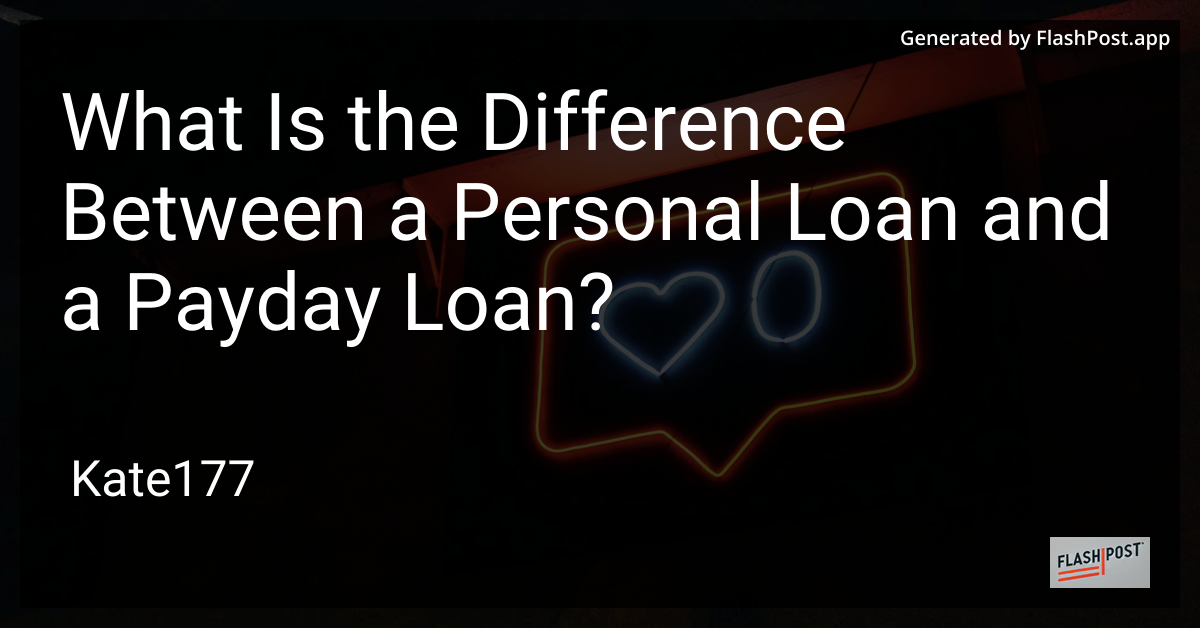
In today's financial landscape, borrowing money has become more accessible than ever. However, with this accessibility comes a plethora of loan options that can be confusing for many consumers. Two of the most common types of loans are personal loans and payday loans. Understanding the difference between these two can significantly impact your financial decisions. In this article, we delve into the distinguishing features of personal loans and payday loans to help you make an informed choice.
What is a Personal Loan?
A personal loan is a type of installment loan offered by banks, credit unions, and online lenders. It provides borrowers with a lump sum of money that is repaid over a predefined period, typically ranging from two to five years, through monthly installments. Personal loans can be either secured or unsecured, with the latter being more prevalent.
Key Features of Personal Loans: - Longer Repayment Term: Personal loans usually have longer repayment terms, allowing borrowers to pay back the loan over several years. - Higher Loan Amounts: Borrowers can access larger sums of money, making them suitable for substantial expenses such as home renovations or loan consolidation. - Lower Interest Rates: Due to the extended repayment term and good credit requirements, personal loans often come with lower interest rates. - Credit-Based Approval: Approval for a personal loan typically depends on your credit score and financial history. If you're concerned about income verification, you might consider options for obtaining a personal loan without proof of income.
What is a Payday Loan?
Payday loans are short-term, high-cost loans designed to provide borrowers with quick cash to cover expenses until their next paycheck. These loans are generally intended for emergencies or small financial gaps and are widely available from both online lenders and physical storefronts.
Key Features of Payday Loans: - Short-Term Repayment: Payday loans usually require repayment within a few weeks, typically by your next payday. - Small Loan Amounts: These loans are designed for smaller amounts, often ranging from $100 to $1,500. - Higher Interest Rates: Due to their short-term nature, payday loans have significantly higher interest rates and fees compared to personal loans. - Minimal Credit Checks: Payday lenders often do not require a hard credit check, making these loans accessible to those with poor credit or no credit history.
Key Differences
| Feature | Personal Loan | Payday Loan |
|---|---|---|
| Loan Term | Longer (2-5 years or more) | Short-term (usually due by next payday) |
| Loan Amount | Larger amounts, potentially up to $100,000 or more | Typically smaller amounts, usually under $1,500 |
| Interest Rates | Generally lower, varying from 5% to 36% | Extremely high, often exceeding 300% annually |
| Approval Process | More stringent, often requiring a simple personal loan application | Quicker, with minimal requirements and credit checks |
| Usage Flexibility | Wide range of uses for substantial financial goals | Typically for urgent, unplanned expenses |
Conclusion
Both personal loans and payday loans offer avenues for borrowing but cater to different financial needs and situations. Personal loans are ideal for those who need larger sums with manageable repayment terms and have a stable credit history. On the other hand, payday loans serve as a fast-cash solution for immediate, short-term financial needs but come with higher costs and risks. Always consider your financial situation, explore all your options, and choose the loan type that best aligns with your needs and ability to repay.